Jeremy
Hogan
Reflects on David Halberstam
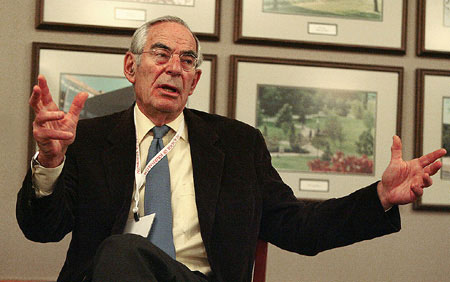
It
was with shock and sadness that I came across the front page of the New
York Times online yesterday evening: David Halberstam,
one of the greatest American journalists of the 20th century, was killed in a
car accident yesterday in California.
It
was a month ago almost to the day that I was in his presence; he had come to Indiana
University to speak with journalism students, professors, members of the community
and even the staff of the local newspaper. I had photographed him once and listened
to his analyses of the current war in Iraq. He said we need to “cut and walk”
because it isn’t working and we shouldn’t have gone there in the first
place.
It could
be argued that the war in Iraq is different than the Vietnam war in many ways:
first of all it’s in the desert, second there isn’t a country like China
supplying the weapons (though some claim Syria and Iran are doing so) and third
this is a war about terrorism not about communism.
But,
there are so many similarities: the U.S. government trained the South Vietnamese
to fight for themselves and they were unable to do so effectively. When Halberstam
was covering the Vietnam War during the early 1960s U.S. advisors were “training”
the South Vietnamese to fight the communist North Vietnamese so we could leave.
The U.S. trained Iraqis are supposed to secure democracy so we can leave.
Two,
this is a guerilla war where the enemy is not necessarily seen, in Vietnam children
ambushed U.S. soldiers with grenades and now in Iraq children set off IEDs with
cell phones.
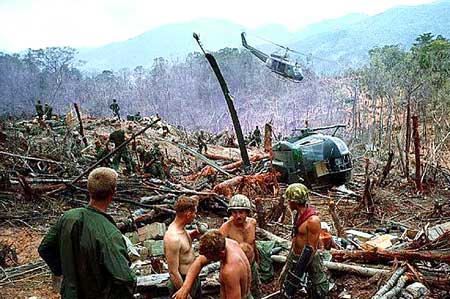
Three,
my father is a Vietnam War Vet and he told me the North Vietnamese were “terrorizing”
the South Vietnamese and the United States was there to give them Freedom. The
goal of the United States was to help them gain their freedom and then leave but
as the 60s went on we were drawn more and more into the war.
In
1965 Lyndon B. Johnson decided to escalate the war and send more American
troops since the South Vietnamese troops weren’t getting the job done and
a culture of corruption had made America’s attempt to mold Vietnam a failure.
Now today, we have the surge and many more than 20,000 troops will be sent to
Iraq.
Does this
seem familiar?
By
the mid 1960s David Halberstam was no longer reporting on the war in Vietnam.
But a few years later my own father would be there and my own father would eventually
come home extremely troubled, not only about what he saw there and what he did
- including a stint in Cambodia in 1970 - but about what the United States had
become.
There is
another difference too that Halberstam pointed out: It’s not the children
of the wealthy and the middle class who are fighting this war it’s the poor
mostly and since there is no draft there is very little of the outrage on college
campuses now that was present in the 60s. I have to admit that my father is no
fan of Jane Fonda and his listening to the Beatles and Jim Hendrix and Bob Dylan
is somewhat surprising given how much the whole hippy turned yuppie crowd seems
to have pissed him off. Basically, from his working class perspective, he thinks
they’re spoiled people that don’t understand anything about how the
world really works. Caught in the middle, I see things not only from my father's
point of view, but having gone to college, from other points of view as well.
But, that’s the subject of another essay.
It
was with great interest 10 years ago when a college professor gave me a photocopy
of an article in Vanity Fair about a book
that was about to be released called, “Once
Upon a Distant War” by William Prochnau. A few
months later I read the nearly 600-page book from cover to cover and learned how
a small group of journalists went to Vietnam believing in the war and quickly
learned otherwise by getting on helicopters and going out to battles where they
spoke with the people doing the fighting not some people as a think tank in Washington,
D.C.
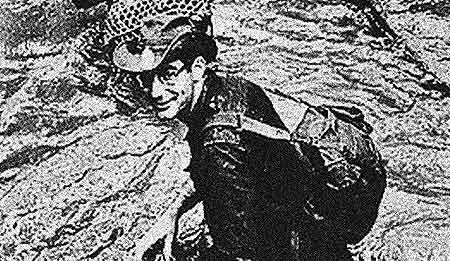
As
a reporter for the New York Times Halberstam
reported things that were much different than what the "official" sources
in Washington, D.C. were telling the Washington based media who were not on the
ground in Vietnam seeing the actuality of what was really happening. President
John F. Kennedy was so enraged when he read Halberstam’s reports in
the New York Times that he called Halberstam’s bosses and demanded that he
be reassigned. But, Halberstam was reporting the truth as he saw it not what some
Washington politicians wanted reported which were a series of delusions based
on their own political goals not the reality of the situation.
Presently
there are hundreds of public relations agencies that are spinning a thousand different
stories and some of these agencies helped spin the media and this is partially
how we got into this current situation in Iraq *.
However, as someone said, Halberstam couldn not be spun. And this is the best
kind of journalist.
However,
three years ago had Halberstam said the things he was saying a month ago about
the war in Iraq, to a mostly upper middle class college audience of professors
and administrators, there would have been a lot more skeptics than there are now
four years after the beginning of this war which has cost thousands of lives and
much more money than the governments is telling us.
When
I heard that Halberstam would be coming to town and I would be photographing him
I was very interested in doing so. You know they say, sometimes one shouldn’t
meet their heroes, or in my case, see them in person but I say not necessarily
so. Because the Halberstam I photographed from a very close proximity was as gracious
as could be, smart, intelligent, urbane and much more impressive a person that
I ever would have imagined.
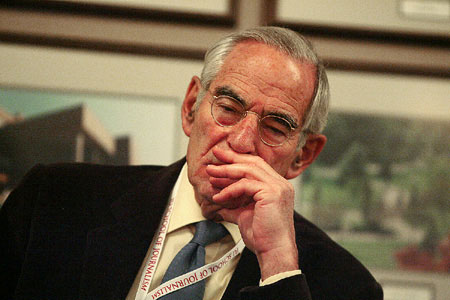
Someone
asked David Halberstam who is doing a good job reporting the war in Iraq, there
was a pause and then he said John Stewart. Then Halberstam gave praises about
Hunter S. Thompson saying he was one of the ones that got right the story
about the Vietnam War.
Yesterday
was a very sad day in American journalism and now it falls upon my generation
of journalists to fill Halberstam’s shoes, not to mention Hunter’s,
and they are indeed big ones to fill.
Will
my generation of journalists just watch John Stewart and complain about how bad
the future of journalism is? I don’t have the answers and I can’t remember
a time when journalism was a more demoralizing profession to be involved with
but the stakes are the future of journalism as a credible force for good and not
to mention, the future of this experiment we call America.
A
Tribute to David Halberstam at
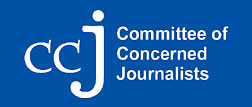
Click
Here to Read stories from the Journalists
who worked with David Halberstam on some of his biggest stories and share their
memories of his work and his bright Spirit.

*
Air Check Be sure to watch Bill Moyers "Buying
The War" a documentary focusing
on the corrupt actions by the dominant political and media organizations which
deceived the American people into the invasion of Iraq. Click
Here to View.
Click
Here To Learn More about Jeremy
Hogan